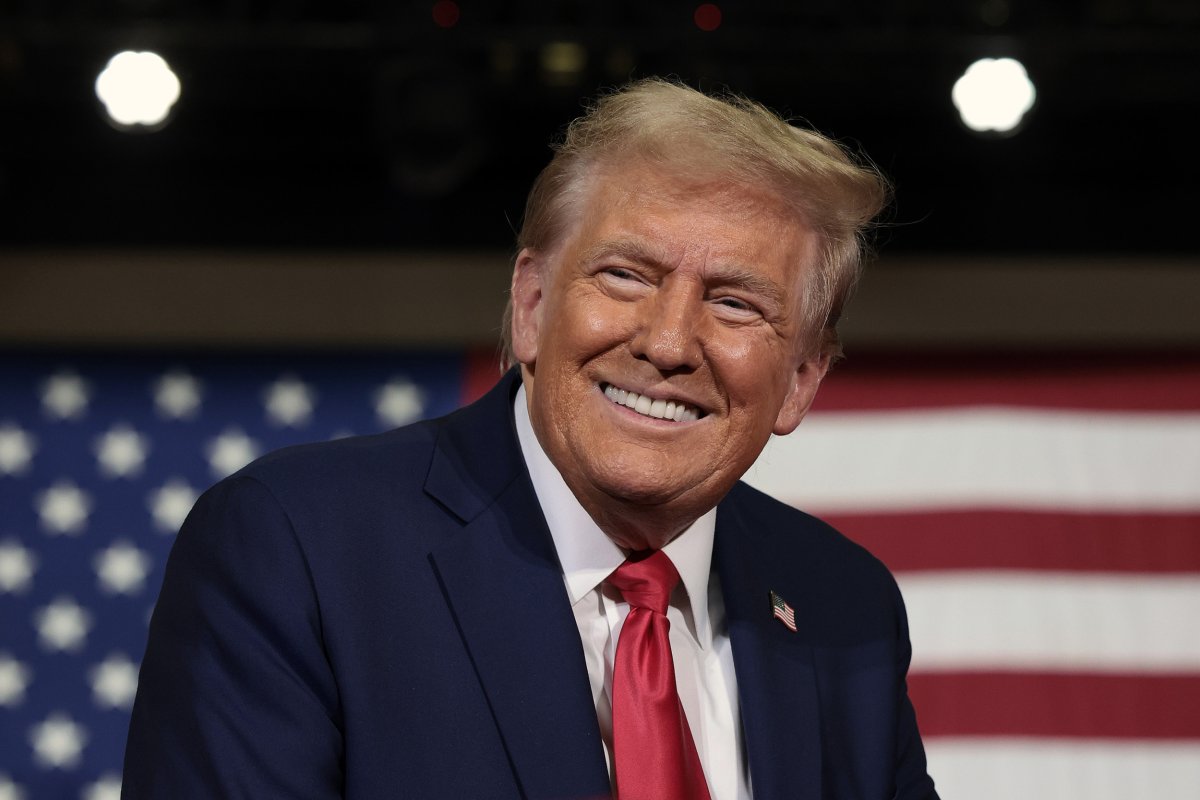The race for the White House between Vice President Kamala Harris and former President Donald Trump has been billed as “New Way Forward” versus “Make America Great Again.”
But as the United States of America heads into the home stretch of the 2024 presidential election, both candidates face accusations of a lack of clarity on their policies and flip-flopping on some of the key issues that voters will have foremost in their minds as they cast their ballots.
Newsweek has set the Republican and Democrat candidates head-to-head with a breakdown of each campaign’s stance on the most critical issues.
The Economy
Harris
Kamala Harris has campaigned on the promise of an “Opportunity Economy,” and her campaign website lists “building up the middle class” as a key goal of her hypothetical presidency.
Central to her plans is addressing America’s housing crisis, and the Harris campaign has promised to build three million affordable rental units and homes, provide first-time buyers with up to $25,000 for down payments, as well as to “cut red tape” preventing home construction.
During her September 25 sit-down interview with MSNBC‘s Stephanie Ruhle, Harris said that her administration would prioritize America’s steel manufacturing sector while also “investing in new industries.”
At her Pittsburgh campaign rally a few hours prior, Harris said she would offer tax credits to companies that expand “good union jobs in steel and iron and manufacturing communities.” She also pledged increased investment in the biomanufacturing and aerospace industries and committed to “remain[ing] dominant” in artificial intelligence and quantum computing.
The candidate has also promised to use her first 100 days in office to pass a federal ban on “price gouging,” and to raise the federal minimum wage from $7.25, though her campaign has so far not revealed the extent of this increase.
The Harris-Walz campaign also promised to “fight for unions,” and to sign pro-worker legislation such as the Protecting the Right to Organize Act, a proposed law that would strengthen labor protections and employees’ ability to collectively bargain.
Trump
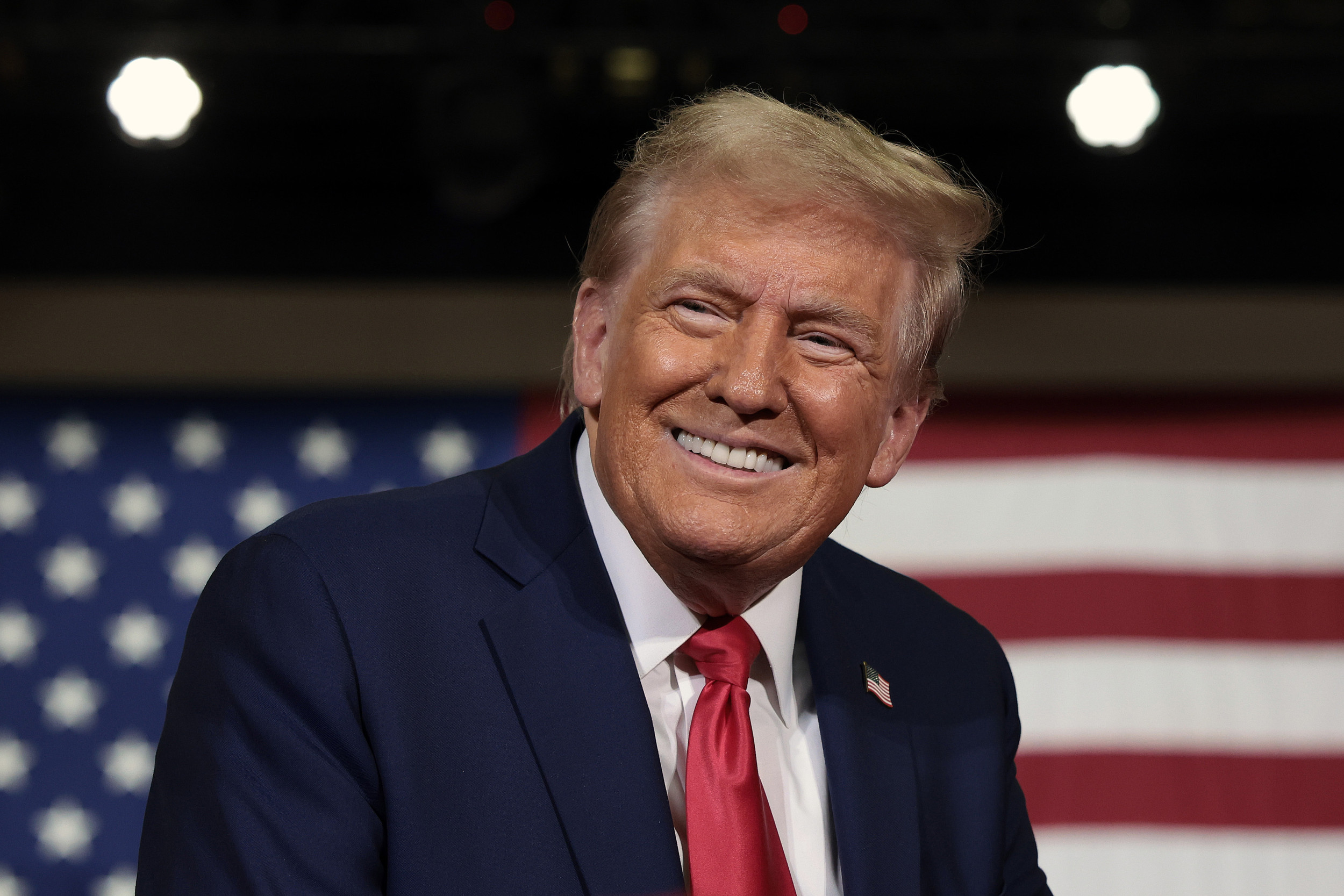
Republican presidential nominee, former U.S. President Donald Trump, speaks during a town hall campaign event at the Lancaster County Convention Center on October 20, 2024 in Lancaster, Pennsylvania. Trump’s economic agenda has revolved around expanding domestic oil and gas drilling, extending his 2017 tax cuts, and slapping tariffs on foreign imports to increase the competitiveness of American industry.
Win McNamee/Getty Images
Donald Trump’s economic agenda, meanwhile, is concerned with putting an end to “reckless big government spending” and leveling the free trade playing field.
“Drill, baby, drill” has become a key slogan of his campaign, and Trump plans to “unleash” America’s natural oil and gas reserves in an effort to reduce fuel costs and inflation, as well as to increase the country’s energy independence.
Trump has also promised to pay off the country’s national debt, now running at just over $35 trillion according to the Department of Treasury.
According to a YouGov poll conducted between September 10 and 11, Trump is winning over more Americans on the central issue of the campaign.
Fifty-six percent of respondents said Trump would handle the economy “somewhat” or “very well” if elected in November, compared to just 49 percent for Harris.
Taxes
Harris
Harris aims to expand the Earned Income Tax Credit for lower-income workers and has promised to extend President Joe Biden‘s pledge to avoid tax increases on American households making $400,000 or less per year.
Harris and Walz “will ensure the wealthiest Americans and the largest corporations pay their fair share,” according to the campaign website, which pledges to increase the corporate tax rate to 28 percent from 21 percent and to impose a 28 percent long-term capital gains tax on those earning a million dollars or more annually.
Harris has proposed a $6,000 child tax credit for families with newborns, up from the current $2,000, and a credit of $3,600 per child for families with children under 6.
The campaign has also promised to increase the startup expense deduction from $5,000 to $50,000, increasing the amount of profit small businesses will be able to deduct from their taxes, which the campaign has said will “help give small businesses, entrepreneurs, and founders the confidence to make the investments they need to get off the ground.”
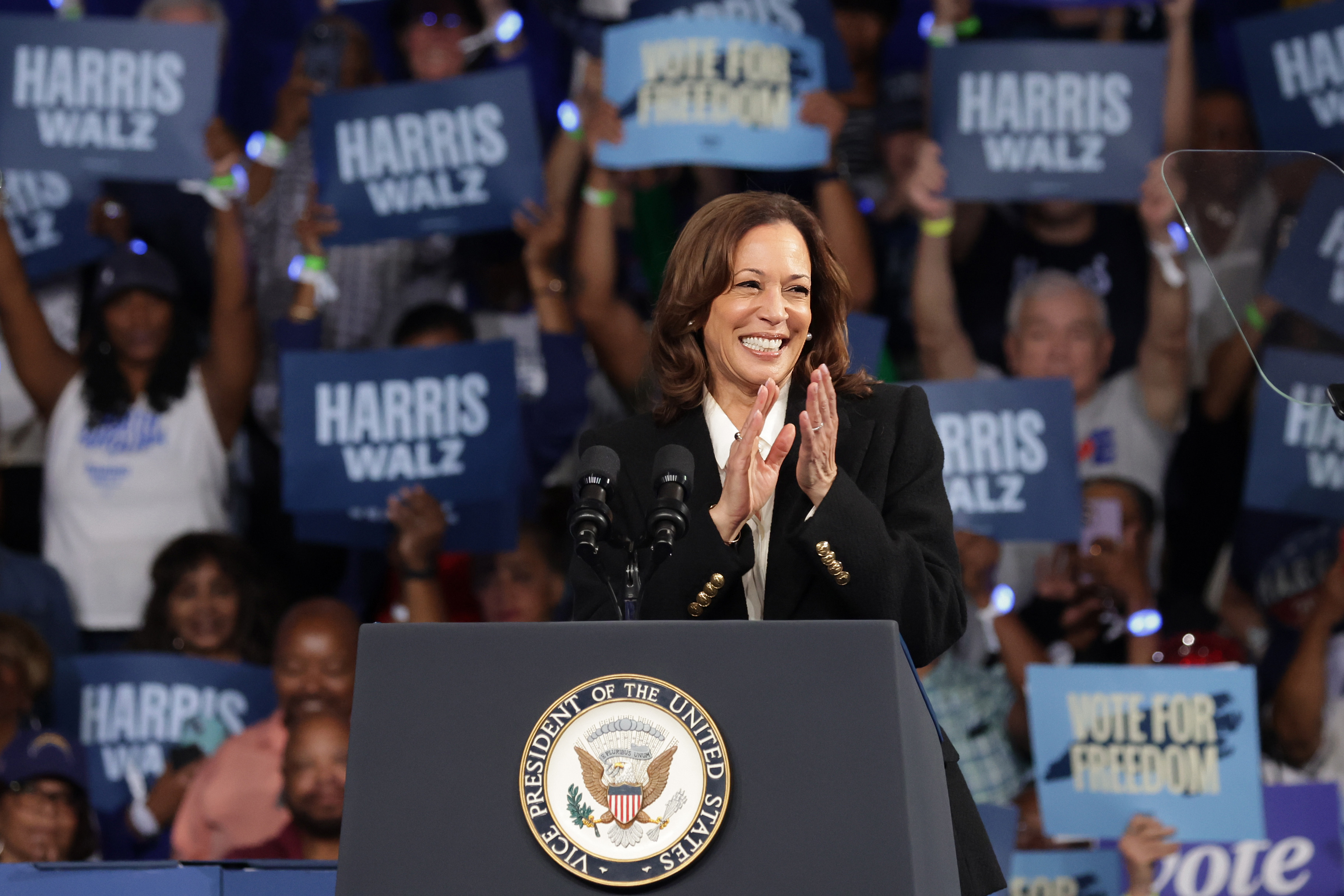
Democratic presidential nominee, Vice President Kamala Harris during a campaign rally on October 13, 2024, in Greenville, North Carolina. Harris economic vision entails a focus on emerging industries, increasing the corporate tax rate and “building up the middle class.”
Alex Wong/Getty Images
Trump
So far, Trump has said he plans to slash corporate taxes to 15 percent and to extend his 2017 individual tax cuts. At a September rally in Savannah, Georgia, however, Trump said that the former would only apply to “those who make their product in the U.S.A.”
“Donald Trump recognized long before he became president that we cannot have free and open trade if some countries exploit the system at the expense of others,” the former president’s website reads, and his campaign has vowed to place tariffs ranging from 10 to 20 percent on most U.S. imports, rising to 60 percent or more on imports from China.
During a September 23 rally in Indiana, Pennsylvania, Trump took this promise a step further by issuing a warning to John Deere, which recently revealed plans to move some manufacturing jobs to Mexico from the U.S.
“I am just notifying John Deere right now, if you do that, we’ll put a 200 percent tariff on anything you want to sell into the United States,” Trump said to the crowd at Ed Fry Arena.
Both candidates have also promised to eliminate taxes on tips for those in the service and hospitality industries.
According to YouGov’s poll, 50 percent of Americans believe Trump would handle the issue of taxes very or somewhat well if voted in, compared to 46 percent for Harris.
Crime
Harris
Harris’s crime policy centers on what her campaign views as the primary catalyst of violent crime in America: Guns.
“She’ll ban assault weapons and high-capacity magazines, require universal background checks, and support red flag laws that keep guns out of the hands of dangerous people,” according to the candidate’s website.
At a recent rally in North Carolina, the vice president also promised to “finally pass an assault weapons ban,” reinstating the 1994 bill that expired in 2004.
While the vice president has previously voiced support for “defunding the police,” this has so far failed to make its way into her policy proposals, which include “invest[ing] in funding law enforcement,” as well as hiring and training more officers.
Trump
Trump, similarly, promises to deliver unspecified “record funding” to hire and retrain police officers.
While supporting red flag laws and background checks previously, Trump has branded himself as a staunch defender of the Second Amendment.
Days after the July 13 assassination attempt, Trump adviser Chris LaCivita told the audience at an event hosted by the U.S. Concealed Carry Association that the former president would appoint federal judges who oppose firearm limitations if elected in November.
Judging by his presidential record, however, the pair do share some policies on criminal justice reform.
Harris voted for the First Step Act, signed into law by Trump in December 2018, which reduced certain sentences and granted some prisoners early releases based on their involvement in recidivism reduction activities.
Some 54 percent of those polled trust Trump to do very or somewhat well on the issue of crime, compared to 46 percent for the vice president.
Immigration
Harris
While characterized as a “failed border czar” by Trump and the Republican Party, “securing our borders and fixing our broken immigration system” is listed on the vice president’s website as a key focus of her campaign.
Her campaign manager, Julie Chávez Rodríguez, told CBS that Harris would uphold President Biden’s June executive order limiting the number of asylum claims the U.S. would process when the border is “overwhelmed.”
Harris has also promised to bring back the bipartisan border security bill, voted down by Senate Republicans in May, which would increase funding and personnel for border patrol while freeing up $650 million for the continued construction of a border wall.
Trump
Perhaps more than any other issue, Trump has framed securing the southern border as a central campaign promise.
“President Trump will shut down the Harris-Biden Administration’s border disaster,” the former president’s website reads, alongside promises to end “catch and release” practices, and to restore the Remain in Mexico policy, in place between January 2019 and June 2022, which required asylum seekers to remain in Mexico until their U.S. immigration court date.
Alongside completing what he calls the “Trump wall,” the former president has also put mass deportations at the heart of his immigration program and on Oct. 13 pledged to hire an additional 10,000 border patrol agents if elected.
In late September, the former president said that this deportation program would extend to those immigrants admitted under the Biden Administration’s Humanitarian Parole program, or those allowed to stay in the country under Temporary Protected Status.
According to YouGov, 53 percent of respondents believe Trump would do well when it comes to immigration, compared to 45 percent for Harris.
Abortion
Harris
As with Trump and immigration, Harris has made abortion and reproductive freedom the flagship issue of her campaign.
Harris has criticized Trump for “handpicking” the Supreme Court justices who were instrumental in overturning the landmark Roe v. Wade decision—a fact about which the president himself has bragged—and her campaign website promises to “defend reproductive freedom.”
“As President, she will never allow a national abortion ban to become law,” her policy page reads. “And when Congress passes a bill to restore reproductive freedom nationwide, she will sign it.”
In late September, the candidate told Wisconsin Public Radio that she would favor “eliminating the [Senate] filibuster,” in order to push the national abortion safeguards of Roe through Congress.
Trump
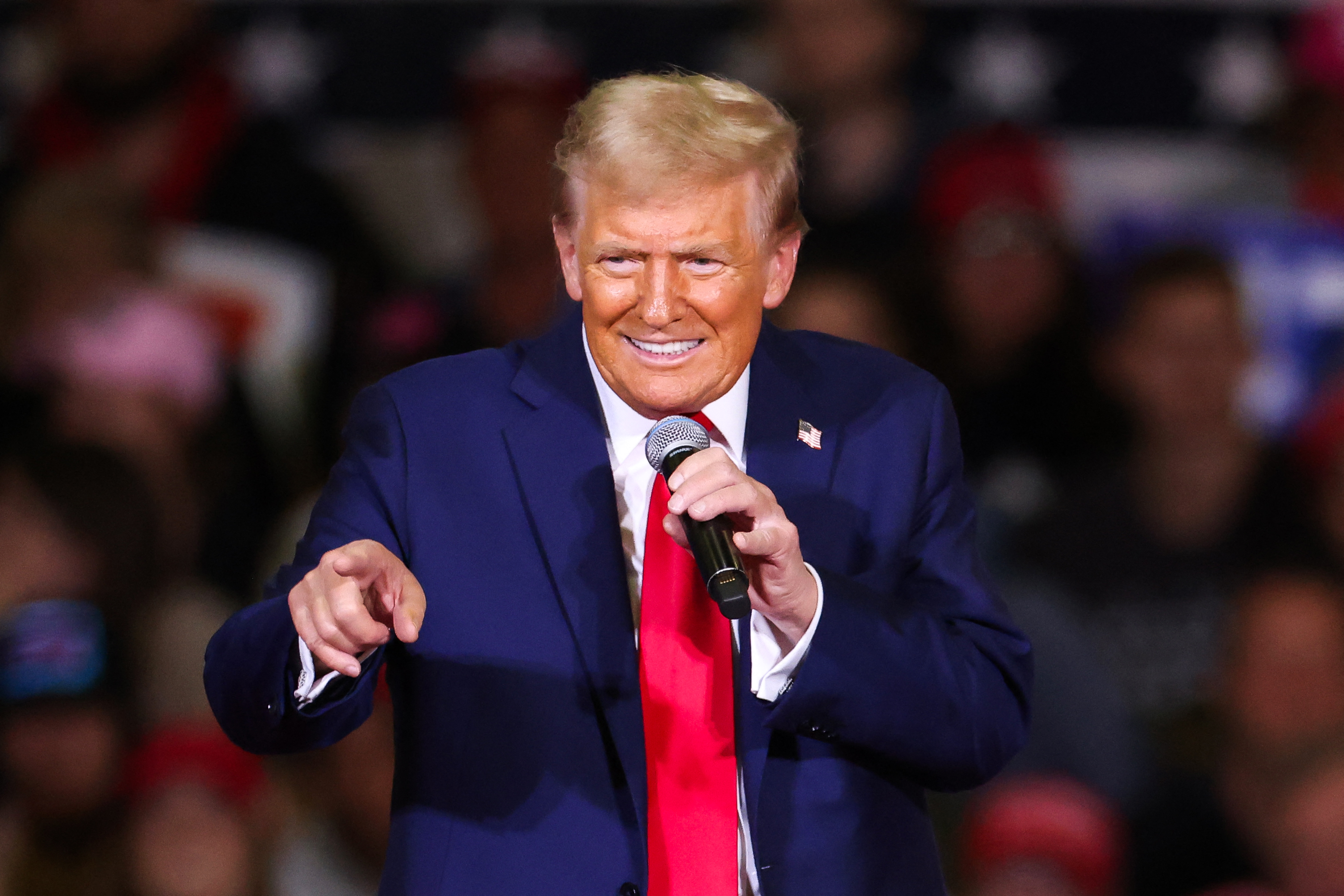
Former U.S. President and Republican presidential candidate Donald Trump speaks during a town hall at the Convention Center in Lancaster, Pennsylvania, October 20, 2024. Newsweek compared Trump and Harris platforms of the upcoming election.
Charly Triballeau/AFP via Getty Images
As one of his weakest campaign issues, Trump has remained tight-lipped on the issue of abortion, neglecting to mention it in his 2024 campaign platform beyond the promise of “oppos[ing] late-term abortion.”
Despite refusing to answer whether he would support a national abortion ban during the September 10 debate, Trump later took to Truth Social to declare that he “would not support a federal abortion ban, under any circumstances, and would, in fact, veto it,” adding that the matter was “up to the states to decide.”
In late August, however, the former president said he would vote to uphold Florida’s six-week abortion ban, after receiving backlash from anti-abortion activists for criticizing the controversial policy.
During his September 23 rally in Pennsylvania, Trump praised the “brilliant and brave” Supreme Justice for their role in overturning Roe, but added that he agreed with unspecified “exceptions” to bans on abortion.
On abortion, 44 percent of those polled by YouGov said they trust Trump to do well on the issue, compared to 56 percent for Harris.
Healthcare
Harris
Harris’s campaign promises to “take on Big Pharma to lower drug prices and cap insulin costs” and build on the healthcare policies of the Biden administration.
These include the $35 cap on insulin, as well as the $2,000 cap on out-of-pocket spending for prescription drugs, the latter included in the 2022 Inflation Reduction Act.
Harris has also called for medical debt forgiveness, and to enhance premium support through the Affordable Care Act, a promise her campaign has said will “save millions of Americans an average of $800 per year.”
As with groceries, the vice president has also pledged to end price gouging by “pharmacy middlemen.”
While Harris previously signaled support for abolishing private health insurance and co-sponsored Senator Bernie Sanders’s 2019 Medicare for All bill, her campaign has toned down its commitment to single-payer healthcare and claims to be focused on strengthening the Affordable Care Act and lowering drug prices.
Trump
During the recent debate, Trump claimed to possess “concepts” of a plan for U.S. healthcare, and the former president has been accused of flip-flopping on the issue.
“Healthcare and prescription drug costs are out of control,” Trump’s 2024 platform states. “Republicans will increase transparency, promote choice and competition, and expand access to new affordable healthcare and prescription drug options.”
YouGov polling shows Harris leading Trump on this issue, with 55 percent believing she would do well when it comes to healthcare, compared to 46 percent for the former president.
Foreign Policy
Her campaign has promised to “strengthen, not abdicate” America’s global leadership, and Harris has twice stated that the U.S. will defeat China in the “competition for the 21st century.”
The vice president supports maintaining the defense budget, and in March, the Biden-Harris administration submitted a fiscal year 2025 budget to Congress requesting $849.8 billion for the Department of Defense, up from a request of $842 billion submitted a year prior.
In keeping with his party’s historical policy, Trump promises to fix “our depleted military,” while also “keep[ing] America out of unnecessary foreign wars” and pushing its NATO allies to increase their defense spending to 3 percent of GDP.
Russia-Ukraine
Harris has vowed to continue her administration’s commitment to supporting Ukraine, without detailing what form this would take.
Her website cites her role in the Biden administration’s efforts to “mobilize a global response of more than 50 countries to help Ukraine defend itself against Vladimir Putin‘s brutal aggression.”
Harris has also criticized the former president’s perceived light-touch approach to the Russian President, and during the September debate said that, were Trump in office when the invasion began, “Putin would be sitting in Kyiv right now.”
Trump has promised to end the Russia-Ukraine war “in 24 hours,” but has not provided specifics on his strategy.
During the debate, Trump avoided giving a direct answer to the question of whom he hoped would win the conflict, instead responding that he wanted “the war to stop,” and claiming he would be able to broker a deal between the pair.
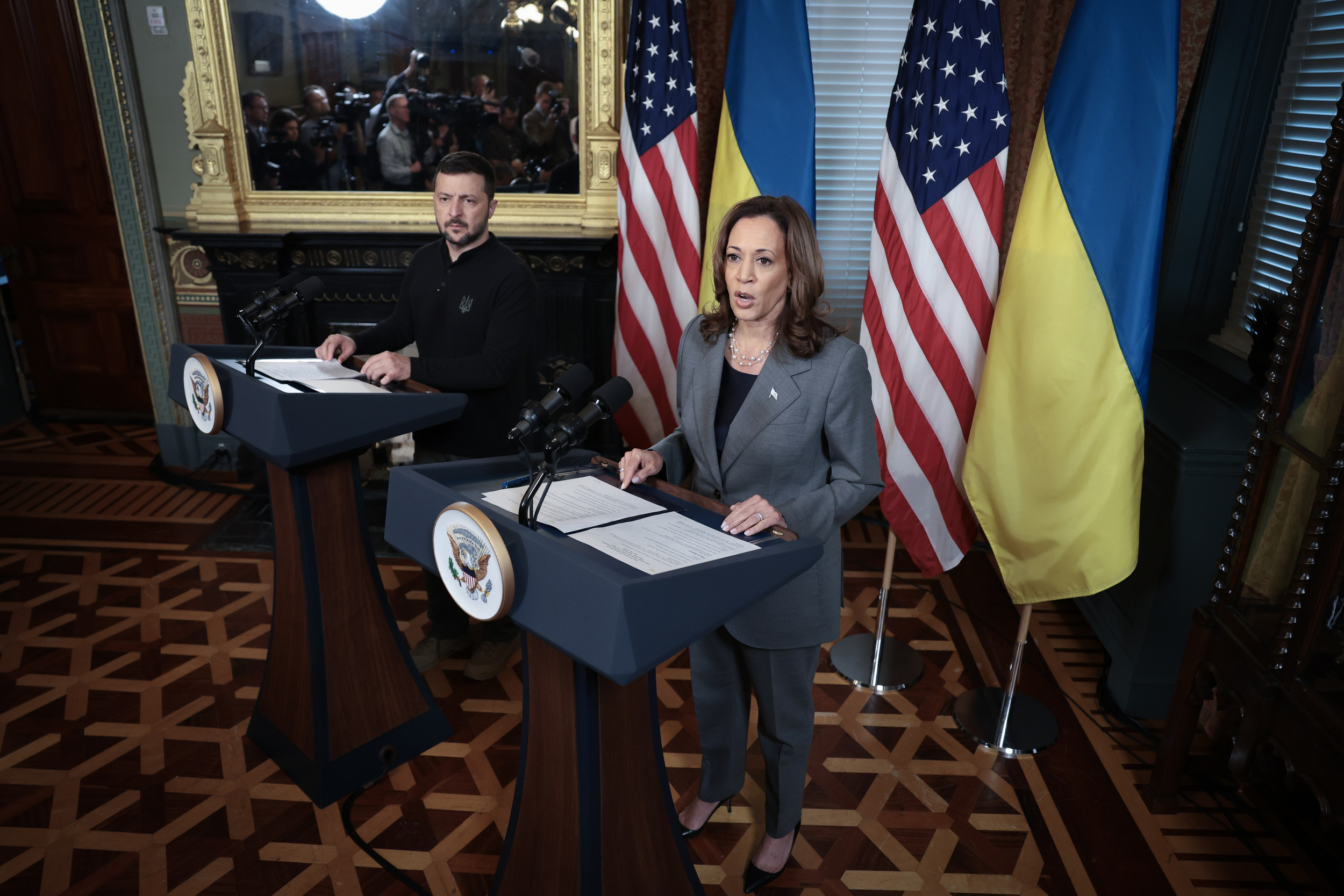
Democratic presidential nominee, U.S. Vice President Kamala Harris, meets with Ukrainian President Volodymyr Zelensky in the Vice President’s Ceremonial Office September 26, 2024, in Washington, D.C. Newsweek compared Trump and Harris in terms of foreign policy.
Win McNamee/Getty Images
Israel-Palestine
Harris’s campaign has also promised to “always stand up for Israel’s right to defend itself,” while also ensuring that “the suffering in Gaza ends,” telling a group of supporters in August that “now is the time to get a ceasefire deal and get the hostage deal done.”
Trump adopted a largely pro-Israel stance during his presidency, though his 2024 campaign has not focused heavily on the Israeli-Palestinian conflict.
In 2018, Trump oversaw the symbolic move of the American embassy to Jerusalem from Tel Aviv. However, his 2020 “Trump Peace Plan” also envisaged a future Palestinian state.
In September, Trump addressed an Israeli-American Council summit in D.C., during which he dubbed himself Israel’s “big protector.”
Following Iran’s Oct. 1 missile attack on Israel, Trump urged the country to retaliate by striking Tehran’s “nuclear stuff.”
According to YouGov, 52 percent of respondents believe Trump would do very or somewhat well on foreign policy, compared to 49 percent for Harris.
Newsweek has reached out to the Harris and Trump campaigns for comment.
Update 09/25/24 10:43 a.m. ET: This article was updated with additional content.
Update 09/24/24 3:41 a.m. ET: This article was updated with additional content.
Update 09/24/25 3:19 a.m. ET: This article was updated with additional content.
Update 09/25/24 4:50 a.m. ET: This article was updated with additional content and new photos.
Update 10/02/24 2:17 p.m. ET: This article was updated with additional content and new photos.
Update 10/16/24 10:18 a.m. ET: This article was updated with additional content and new photos.
Update 10/22/24 11:46 a.m. ET: This article was updated with additional content and new photos.
Do you have a story we should be covering? Do you have any questions about this article? Contact [email protected].
The post Comparing Harris and Trump’s Policies on 7 Key Issues appeared first on Entertainment Mind.

